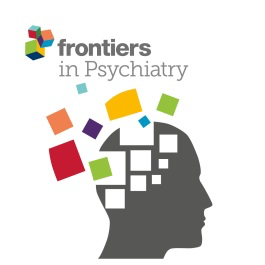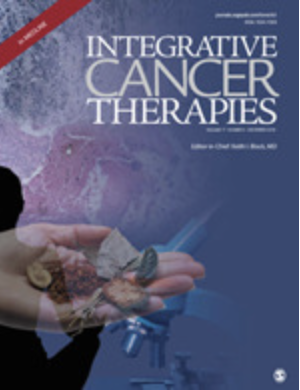Cancer-Related Insomnia
How to submit an article:
- Registered users can submit any published journal article that has a unique DOI (Digital Object Identifier) name or link to Research Hub.
- For example, you can paste the full DOI link:
https://doi.org/10.1109/5.771073or just the DOI name:10.1109/5.771073into the field above and click submit. - The person who is first to submit a valid article to Research Hub will forever be credited for it, and every article submission earns you +6 Research Points.
Published research studies are articles that present the findings of original research that has undergone a peer-review process and has been made publicly available in scholarly journals, books or other media.

Acupuncture and moxibustion in patients with cancer-related insomnia: A systematic review and network meta-analysis
2023 Feb 16 Frontiers in Psychiatry Ou Y, Lin D, Ni X, Li S, Wu K, Yuan L, et al.
Systematic Review Meta-Analysis Moxibustion Cancer-Related Insomnia AcupunctureAcupuncture, especially TEAS, is safer and more effective than medication for improving sleep quality in cancer related insomnia
Acupuncture and Moxibustion Show Promise for Chronic Renal Insufficiency

Auricular Acupressure Therapy for Patients with Cancer with Sleep Disturbance: A Systematic Review and Meta-Analysis
2021 Oct 14 Evidence-Based Complementary and Alternative Medicine Wang Y, Zhang J, Jin Y, Zhang Q
Auricular acupressure can significantly improve the sleep quality of cancer patients with sleep disturbance, with no obvious side effects.
Systematic Review Meta-Analysis Cancer-Related Insomnia Ear Acupuncture
Comparative Effectiveness of Cheonwangbosimdan (Tian Wang Bu Xin Dan) Versus Cognitive-Behavioral Therapy for Insomnia in Cancer Patients: A Randomized, Controlled, Open-Label, Parallel-Group, Pilot Trial
2020 Jan Integrative Cancer Therapies Moon SY, Jerng UM, Kwon OJ, Jung SY, Lee JY, Yoon SW, et al.
Clinical Study Randomised Controlled Trial Cancer Treatment Support Tian Wang Bu Xin Dan InsomniaTian Wang Bu Xin Dan can potentially alleviate symptoms of cancer-related insomnia similarly to cognitive-behavioral therapy.

Acupuncture for Managing Cancer-Related Insomnia: A Systematic Review of Randomized Clinical Trials
2016 Jan 16 Integrative Cancer Therapies Choi TY, Kim JI, Lim HJ, Lee MS.
Systematic ReviewThere is a low level of evidence that acupuncture may be superior to sham acupuncture, drugs or hormone therapy for managing cancer-related insomnia.
Research insights are moderated by the Research Hub team and offer an at-a-glance overview of interesting research findings.

2023 Frontiers in Psychiatry
Acupuncture, especially TEAS, is safer and more effective than medication for improving sleep quality in cancer related insomnia
Systematic Review Acupuncture Moxibustion
Acupuncture and moxibustion in patients with cancer-related insomnia: A systematic review and network meta-analysis
Ou Y, Lin D, Ni X, Li S, Wu K, Yuan L, et al.

2023 Frontiers in Psychiatry
Acupuncture and Moxibustion Show Promise for Chronic Renal Insufficiency
Systematic Review Acupuncture Moxibustion
Acupuncture and moxibustion in patients with cancer-related insomnia: A systematic review and network meta-analysis
Ou Y, Lin D, Ni X, Li S, Wu K, Yuan L, et al.

2020 Integrative Cancer Therapies
Tian Wang Bu Xin Dan can potentially alleviate symptoms of cancer-related insomnia similarly to cognitive-behavioral therapy.
Clinical Study Cancer Treatment Support Insomnia Tian Wang Bu Xin Dan
Comparative Effectiveness of Cheonwangbosimdan (Tian Wang Bu Xin Dan) Versus Cognitive-Behavioral Therapy for Insomnia in Cancer Patients: A Randomized, Controlled, Open-Label, Parallel-Group, Pilot Trial
Moon SY, Jerng UM, Kwon OJ, Jung SY, Lee JY, Yoon SW, et al.

2016 Integrative Cancer Therapies
There is a low level of evidence that acupuncture may be superior to sham acupuncture, drugs or hormone therapy for managing cancer-related insomnia.
Systematic Review
Acupuncture for Managing Cancer-Related Insomnia: A Systematic Review of Randomized Clinical Trials
Choi TY, Kim JI, Lim HJ, Lee MS.
Review Articles
Review articles summarise and critically evaluate the current state of research on a specific topic or field by synthesising multiple primary research studies.

Acupuncture and moxibustion in patients with cancer-related insomnia: A systematic review and network meta-analysis
2023 Feb 16 Frontiers in Psychiatry Ou Y, Lin D, Ni X, Li S, Wu K, Yuan L, et al.
Systematic Review Meta-Analysis Moxibustion Cancer-Related Insomnia AcupunctureAcupuncture, especially TEAS, is safer and more effective than medication for improving sleep quality in cancer related insomnia
Acupuncture and Moxibustion Show Promise for Chronic Renal Insufficiency

Auricular Acupressure Therapy for Patients with Cancer with Sleep Disturbance: A Systematic Review and Meta-Analysis
2021 Oct 14 Evidence-Based Complementary and Alternative Medicine Wang Y, Zhang J, Jin Y, Zhang Q
Auricular acupressure can significantly improve the sleep quality of cancer patients with sleep disturbance, with no obvious side effects.
Systematic Review Meta-Analysis Cancer-Related Insomnia Ear Acupuncture
Acupuncture for Managing Cancer-Related Insomnia: A Systematic Review of Randomized Clinical Trials
2016 Jan 16 Integrative Cancer Therapies Choi TY, Kim JI, Lim HJ, Lee MS.
Systematic ReviewThere is a low level of evidence that acupuncture may be superior to sham acupuncture, drugs or hormone therapy for managing cancer-related insomnia.
Clinical Trials
Clinical trials are research studies that involve people and are conducted to evaluate the safety and efficacy of new treatments or interventions, such as drugs, medical devices, or behavioural therapies.
Study Protocols
Published study protocols are detailed plans that outline the objectives, methodology, statistical analyses, and organisation of a research study that have been made publicly available for others to review and use as a reference.
Presentation Slides

Systematic Review
Acupuncture, especially TEAS, is safer and more effective than medication for improving sleep quality in cancer related insomnia
Ou Y, Lin D, Ni X, Li S, Wu K, Yuan L, Rong J, Feng C, Liu J, Yu Y, Wang X, Wang L, Tang Z, Zhao L

Systematic Review
Acupuncture and Moxibustion Show Promise for Chronic Renal Insufficiency
Ou Y, Lin D, Ni X, Li S, Wu K, Yuan L, Rong J, Feng C, Liu J, Yu Y, Wang X, Wang L, Tang Z, Zhao L

Clinical Study
Tian Wang Bu Xin Dan can potentially alleviate symptoms of cancer-related insomnia similarly to cognitive-behavioral therapy.
Moon SY, Jerng UM, Kwon OJ, Jung SY, Lee JY, Yoon SW, Shin WC, Byun JI, Lee JH

Systematic Review
There is a low level of evidence that acupuncture may be superior to sham acupuncture, drugs or hormone therapy for managing cancer-related insomnia.
Choi TY, Kim JI, Lim HJ, Lee MS.
Executive Summary
Write an executive summary in the form of a blog article on the topic of "Research into Chinese medicine treatment for Cancer-Related Insomnia" summarising the research below and using language that can be easily understood by patients and avoiding medical jargon using a professional and caring tone of voice.
Write an executive summary in the form of a blog article on the topic of "Researched Chinese medicine treatments for Cancer-Related Insomnia" summarising the research below in an objective and easy to understand way, and using language that can be easily understood by patients. Group the article into Chinese medicine treatments first, followed by nutrition and other treatments. Avoid using medical jargon and use a professional and caring tone of voice.
Write me a concise but easy to understand executive summary on the topic of "Chinese medicine treatments for Cancer-Related Insomnia" based on the following research that I will give you. Your summary should be 2 paragraphs long in Australian English spelling and include references to the studies.
A Systematic Review published in 2023 in the journal Frontiers in Psychiatry found that Acupuncture, especially TEAS, is safer and more effective than medication for improving sleep quality in cancer related insomnia Acupuncture methods like transcutaneous electrical acupuncture stimulation (TEAS) and acupuncture+moxibustion were better for sleep than medication. Acupuncture had fewer side effects than medication with positive impact on canner-related insomnia linked to factors like melatonin regulation. Amongst all treatment types, TEAS was probably the more effective.
A Systematic Review published in 2023 in the journal Frontiers in Psychiatry found that Acupuncture and Moxibustion Show Promise for Chronic Renal Insufficiency Acupuncture and moxibustion emerge as effective and safe interventions for chronic renal insufficiency, with Transcutaneous Electrical Acupuncture Stimulation showing the highest potential for efficacy.
A Clinical Study published in 2020 in the journal Integrative Cancer Therapies found that Tian Wang Bu Xin Dan can potentially alleviate symptoms of cancer-related insomnia similarly to cognitive-behavioral therapy. In this study, 22 participants were divided equally between a group given Cheonwangbosimdan and a control group who received cognitive-behavioral therapy for insomnia. Participants in the Cheonwangbosimdan group were required to consume the herbal liquid daily and participate in weekly visits for a period of four weeks. Conversely, the control group underwent behavioral therapy sessions 4 times over the same four-week period. The outcomes from these interventions were evaluated using key indices that measured participants' insomnia severity, sleep quality, fatigue, anxiety, and overall performance status. With the focus being on changes observed from the inception of the trial to the end, these measurements were taken at the conclusion of the fifth week. While no significant difference was found between the two study groups, both displayed a positive trend towards alleviating the symptoms of cancer-related insomnia, with anxiety levels markedly lower in the treatment group.
A Systematic Review published in 2016 in the journal Integrative Cancer Therapies found that There is a low level of evidence that acupuncture may be superior to sham acupuncture, drugs or hormone therapy for managing cancer-related insomnia. Three RCTs showed equivalent effects on the Pittsburgh Sleep Quality Index and 2 RCTs showed the similar effects on response rate to those of conventional drugs at the end of treatment. The other RCT showed acupuncture was better than hormone therapy in the numbers of hours slept each night and number of times woken up each night. The 3 weeks of follow-up in 2 RCTs showed superior effects of acupuncture compared with conventional drugs, and a meta-analysis showed significant effects of acupuncture. Two RCTs tested the effects of acupuncture on cancer-related insomnia compared with sham acupuncture. One RCT showed favourable effects, while the other trial failed to do so. There is a low level of evidence that acupuncture may be superior to sham acupuncture, drugs or hormone therapy. However, the number of studies and effect size are small for clinical significance. Further clinical trials are warranted.
Moderation Tools
Topic
Sign In
Users not signed in are limited to viewing the 5 most recent items of content.